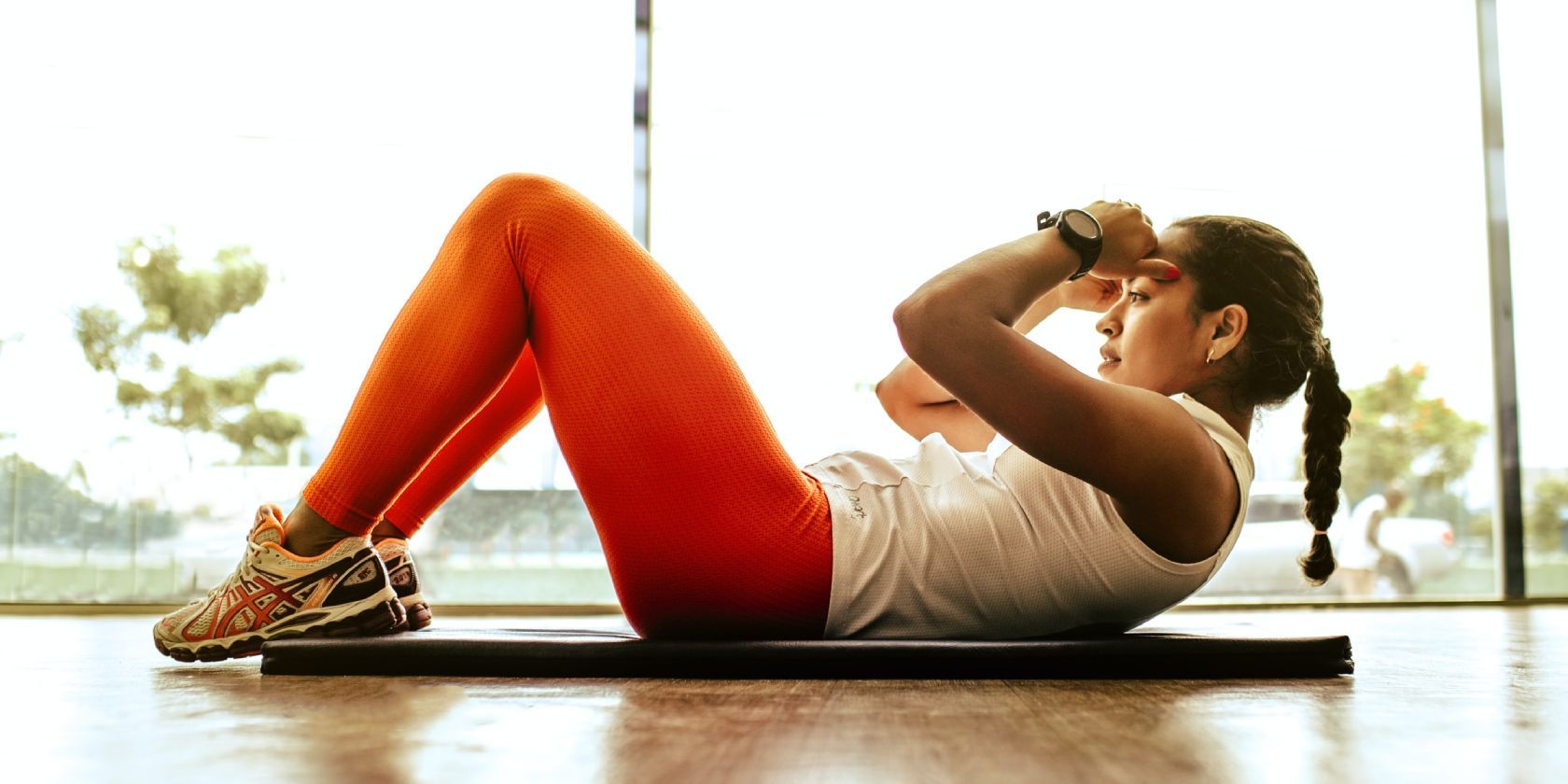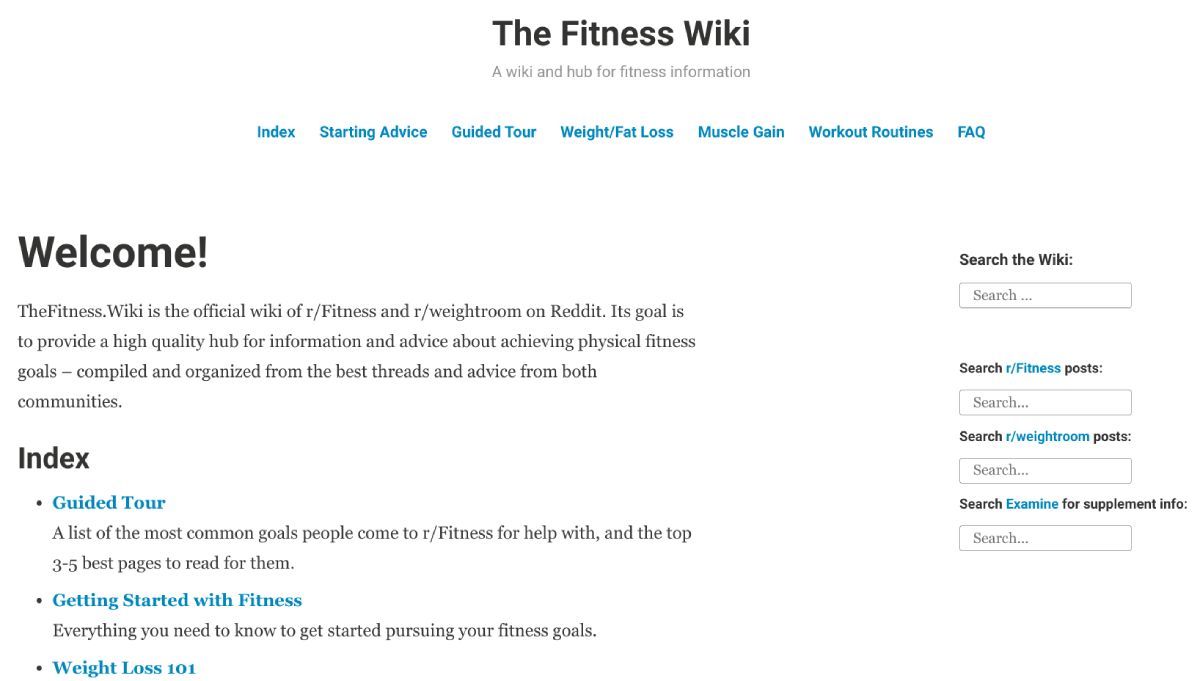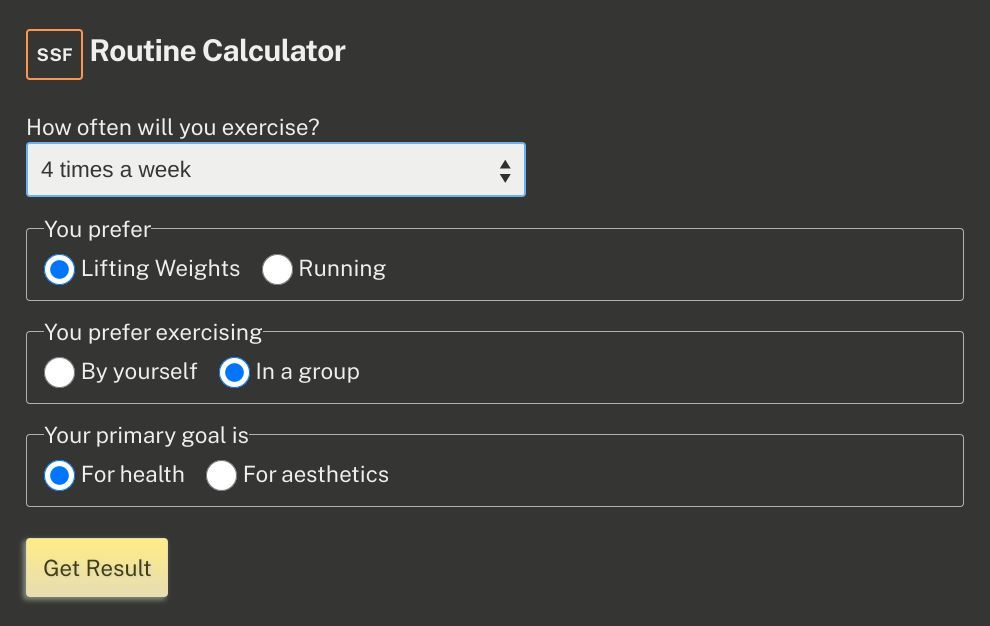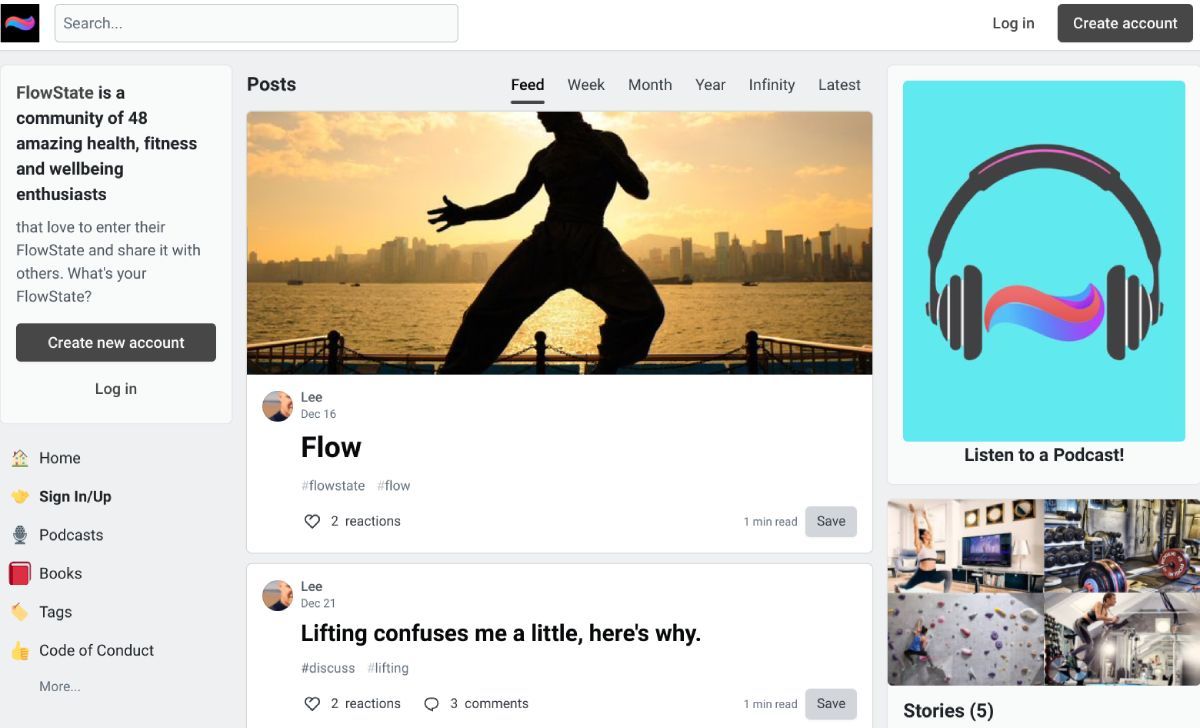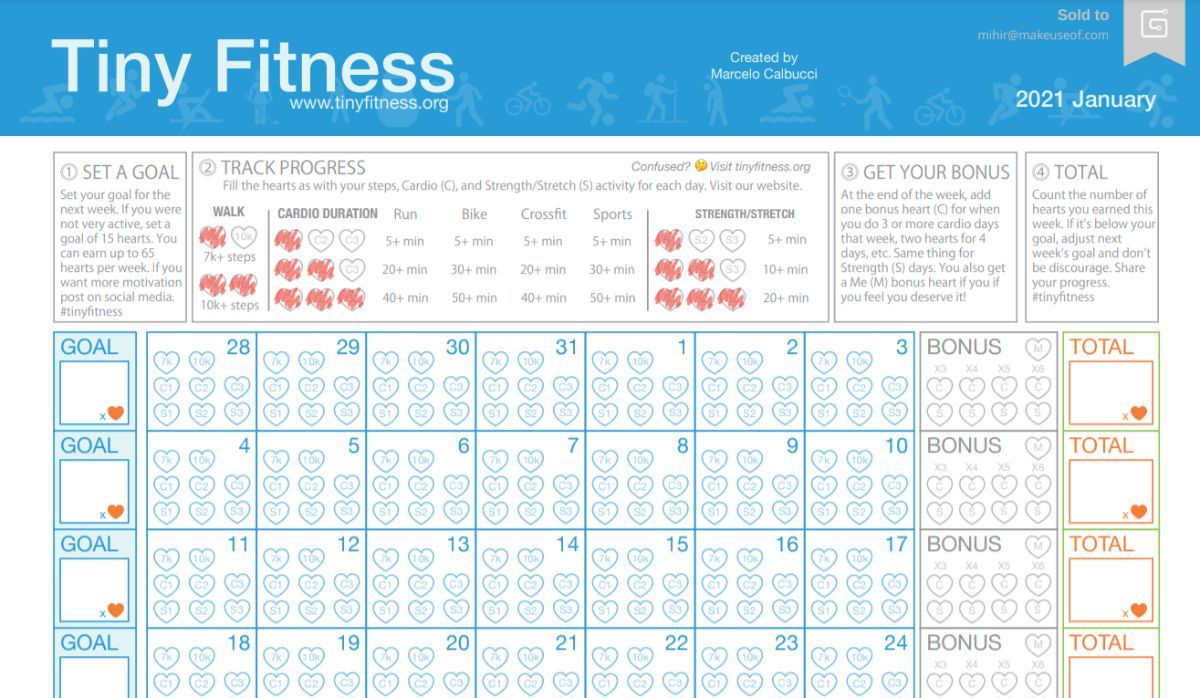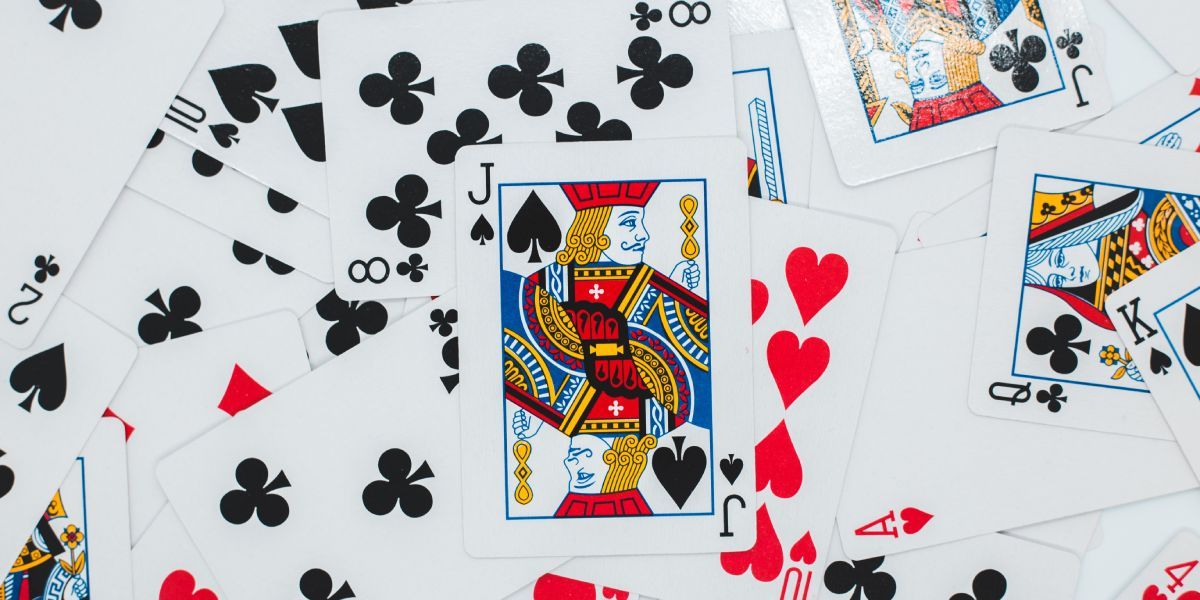Post the holiday binge-eating, the top New Year's resolution is losing weight and getting fit. These free fitness apps will put you on a fitness journey to get in shape.
Fitness is not always about going digital, so this time, we're doing things a little differently. The focus of this article is on the advice you can read online and apply in real life, and having sustainable fitness journeys even away from the computer or phone. This isn't the place for the best workout apps that count reps and show you GIFs or videos of the next exercise routine.
1. The Fitness Wiki (Web): Best Advice From Reddit's Fitness Communities
Reddit users go to r/Fitness and r/WeightRoom for advice on how to get fitter. The Fitness Wiki is a compilation of the best advice on both these subreddits, whether you're looking to lose weight or gain muscle.
Start with the Guided Tour which takes you to the most common reasons people start a fitness journey. Chances are, someone else has already asked questions similar to the ones you have. By learning from their journey and seeing their progress, you'll have a better idea of how you can work your way to a healthy body.
The two most common reasons for working out are weight loss and muscle gain. The Fitness Wiki has a beginner's guide for each of these, explaining the basics of how to start, and collecting a list of the best Reddit threads about it.
Finally, check out the Workout Routines, along with the FAQ on how to choose the right routine for you. There is more than enough free content here for anyone to browse, and is especially great for non-Reddit users to get the best advice from workout communities.
2. Simple Science Fitness (Web): Scientific Approach to a Fitness Journey
Everyone has a secret formula or a magical method to exercise and lose weight. Simple Science Fitness (SSF) relies on hard science, using over 400 cited links to journals and articles to develop a set of essential fitness tools.
The basics teach lessons on lifestyle, diet, and exercise. In simple English, they explain the problems and solutions on a fitness journey. For example, by comparing the average Western lifestyle with the average healthy lifestyle, you'll see the small differences that can make it easier to get in shape.
There are so many exercise options in a gym that it can be overwhelming. SSF uncomplicates this by introducing "The Big Six", a set of six powerful compound exercises that are foundational movements to work your entire body. Based on these, you can find simple workout routines for different fitness levels. There are three free routines, while the rest require a subscription. To find the best routine for you, head to the Routine Calculator which recommends a sustainable and enjoyable workout for you.
The free version of SSF has enough material on the website for any beginner to kickstart their fitness journey. If you like what you read and this scientific approach to fitness works for you, then consider buying a subscription to unlock all resources.
3. FlowState (Web): Community of Fitness and Well-being Enthusiasts
If the people around you are into fitness and wellness, it naturally leads you to maintain that lifestyle. It's why finding a tribe of like-minded people is important. FlowState is a community of health, fitness, and well-being enthusiasts, sharing a social media-like experience.
The community defines a 'FlowState' as being 'in the zone', i.e. a mental state in which you are fully immersed in an activity, feeling energized, focussed, and enjoying it. The feed shows the latest updates from people in the form of one headline, which you click to reveal their full thoughts. It's like a mini-blog. Others are encouraged to comment on the blog then.
FlowState also has a series of recommendations for those into fitness. The podcasts section is a feed of the latest episodes from curated health and fitness podcasts, which you can play on the site itself. Along with that, you'll find book recommendations, articles on building a home gym, and other training guides and resources.
4. Tiny Fitness(PDF): Non-Tech Calendar to Track Fitness Goals
Simplicity is key to sustaining fitness goals and a healthier lifestyle. Tiny Fitness ditches apps and tech for a free calendar you can print out to track your progress. But this is no ordinary calendar, it has a few tricks up its sleeve.
The calendar measures activity in heart logos. The objective is to walk, do cardio, and some strength training and stretches. The measurement scale at the top tells you how many hearts each activity is worth. For example, 7,000 steps is worth one heart, while 20 minutes of running is worth two hearts.
Fill in these hearts for every day of activity. At the end of the week, total them up, and add bonus hearts where applicable through the system. Tiny Fitness urges you to set a weekly heart goal, and suggests 15 hearts being ideal for someone coming from a sedentary lifestyle.
The calendar is free to download and print for an individual. If you're doing a group activity, there's a paid calendar on similar lines. You should also read the blog entries at Tiny Fitness to understand how to track your activities, how to pick the right goal, and how to get motivated.
5. The Deck of Cards Workout (Android, iOS): 52 Exercises for Your Workout Routine
The "Deck of Cards" workout is a popular choice for anyone who wants to mix up their exercises into a fun routine. It is also beginner-friendly and can be done without any apps.
Here's how it works. Take a standard deck of playing cards. Assign an exercise to each suit; for example, hearts are squats, spades are burpees, clubs are touch-down jacks, and diamonds are tuck jumps. Now shuffle the deck. Pick a card, do that exercise, then pick the next card and do that. Cycle through the whole day to do 52 exercises.
It's fast, it's fun, and you can customize it to whatever you want. Each day can be a new set of exercises assigned to each suit. And you can add reps too, like each heart is three squats.
While you can do this with a physical deck of cards, you can also use apps that digitally recreate the Deck of Cards workout. There are several options on both the Play Store and the App Store. Search the stores to find one you like, or go with our picks below.
Download: Deck of Cards - Home Workout for Android (Free)
Download: Deck of Cards Workout for iOS (Free)
Use Mind Hacks to Stick to Workout Routines
You know by now that regular exercise is essential for the human body. These apps and sites can help you start the fitness journey, but finding the motivation to maintain it is on you. If you can visualize why you're doing it and what your goal is, the journey gets easier.
Several people recommend finding a friend or a partner to go with you on a fitness journey. When your motivation is low, they'll egg you on, and vice versa. The road to fitness is tough, so have someone to help you carry the load.

